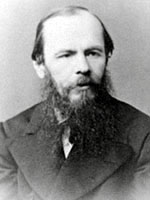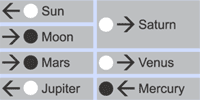The celebrity gallery - Fyodor Dostoevsky
 |
 |
Time of birth: 11.11.1821 16:00:00 Time zone: +4 |
| Fyodor Dostoevsky (1821 – 1981) — a Russian writer, a correspondent member of the St. Petersburg Academy of Sciences. Dostoevsky was arrested and sentenced to death, which was replaced with hard work in exile followed by a service as a private in 1849. He came back to St. Petersburg in 1859. Dostoevsky's work produced a powerful influence on the Russian and world literature. "Crime and Punishment", "The Idiot", "The Brothers Karamazov", "The Demons", "Humiliated and insulted", "The Gambler" and other works are among his most famous. | ||
Interesting facts
The appearance (The White Venus)
Expensive shoes, fashionable hat, the most luxurious suit, ordered from the best designers - everything looked as something wrong, amiss and too short at Dostoevsky. His slouch and angularity, sharp movements and impulsive gestures, lisp and inability to speak calmly, thin beard (he vigorously rubbed "a miraculous cure to increase hair density" into it at one time, though it did not bring any results), different in size and color eyes (the result of trauma, sustained during an epileptic fit) - all this did not make him handsome. "The beauty will save the world". Only a person who himself was deprived of beauty and have not ever have any hope to enjoy it could say this. Feeling sort of Quasimodo, Dostoevsky extremely emotionally reacted to everything beautiful but first of all to women’s beauty.
The temper (The Black Mercury and the White Jupiter)
Fyodor Dostoyevsky had a reputation of quite quarrelsome and incredibly evil man when he was young. Indeed, it was necessary to be an angel not only to survive, but also to take the hard temper of Dostoyevsky for granted. And the fact that Dostoevsky's temper was not easy can prove a lot of things.
Two things aroused his special hostility: the inaccuracy and the negligence. If his friend came over to his house for a minute later or earlier than it was agreed, he could be sent home. "Not before, not later". A favorite saying of the writer should have been taken literally. All sorts of grubbiness, especially in clothing caused even more outrage. If he saw a friend wearing wrinkled dress coat, he gave him a kick in the pants. If he saw a spot on a tie or a suit - good-bye friend and goodbye the friendship! One day he sent home his future wife two times, so that she could "brush up" - he saw a small spot on the cap and the gown.
After he married Anna G. Snitkina, Dostoevsky at the beginning of the marriage life often quarreled with her, shouted at her and even said in one of the fights that the wife is "a natural enemy of her husband". Dostoevsky’s passionate manifestations of jealousy were sometimes comic and sometimes brutal then.
The creativity (The White Sun and the Black Mars)
In Dostoevsky's works we can see the whole portrait gallery of colorful characters, each of them with a unique personality. Lively, frank and at the same time active interest in people, engagement in their lives - it was inherent to Fyodor, and this multi-faceted experience inspired and filled his work. Dostoevsky’s handwriting is unique. The characteristic style of texts written more like a stream of consciousness, is sometimes difficult to understand, however, it easily gives the author of the work away. The lack of prettiness and elegance of presentation (in conventional sense) is offset by some accidental spontaneity and thus the literary images gain a piercing reality in front of the reader.
The ideals (The White Jupiter)
All the "great and wonderful" touched Dostoevsky to the core, he was looking for the absolute good, not tainted with any smallest impurity of selfish limitation or whatever evil. "It is not worth (the higher harmony) a tear of at least one tortured child..." - no wonder this idea was put in mouth of Ivan Karamazov, one of the main characters of the novel "The Brothers Karamazov". Dostoevsky acquired high moral authority and was perceived as a preacher and a teacher (especially at the end of life) in society.
The active compassion (The White Saturn)
Despite his own financial difficulties, Dostoevsky never refused to help the beggars. "When my husband did not have throw-money, and he was begged near our entrance, he led the poor to our apartment and gave the money there", said his wife.
In 1879 a drunken peasant on the street gave Dostoevsky a kick with such force that he "fell on the pavement and draw his face with blood". "In the police station Dostoevsky asked an officer to let the offender go because he forgives him". However, the protocol has already been drawn up and the case was set moving. Dostoevsky told the magistrate that he forgives the offender and asks him not to subject him to punishment. Nevertheless, a judge, bearing Dostoyevsky’s request, sentenced the peasant "for making noise" and disorder on the street to a fine of 16 rubles, with a replacement of arrest for four days. Dostoevsky waited for the offender at the entrance and gave him 16 rubles to pay the fine.
The addictions (The Black Moon)
Fyodor M. Dostoevsky (The Black Moon) wrote his famous novel "The Gambler", based on the personal negative experience of dependence on the game of roulette. Dostoevsky visited Bad Homburg three times and played the casino. He often lost in roulette large sums of money, getting into hopeless situations. Nevertheless, the great writer could cope with his passion (not without the help of the "outside") and he did not play at all for the last ten years of his life.